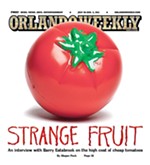Electric Eden: Unearthing Britain's Visionary Music
Scratch the surface of all that faeries-and-druids stuff that tinges '70s folk-rock, and you'll find some deeply twisted, "Wicker Man"-type weirdness. (Patricide and incest, midnight orgies in the fields, smashed limbs around the Maypole … without TV, people got up to some creepy pastimes.) Rob Young, editor of British experimental-music mag The Wire, set out "to write a history of British folk-rock's high-water mark" (Vashti Bunyan, Nick Drake, Pentangle, Incredible String Band et al.) but got sucked down past that High Hippie Royalty into a pool of Elizabethan ballads, Blakean mysticism, Morris dancing and the mud of the Somme. The book breaks free of pastoralia, though, never forgetting to interact with the modern world, no matter how much some of its subjects might have: Young starts in the mists of antiquity and lingers in the folk-saturated 1970s, but he traces a lineage from the druids to Gustav Holst to Philip Heseltine to the Fairport Convention to Marc Bolan to Talk Talk to Julian Cope.
In the first chapter a young Vashti Bunyan decides to drop out of civilized society, and Young's description of the damp English summer, the wisps of mist wreathing thorny hedgerows bathed in golden light, captures the diamond-days tenor of the time without resorting to politics or polemics. The tidal pull of British nostalgia for Avalon/Arden/Albion manifests here as a background susurrus, whispering through Young's painstaking research; "Electric Eden" is not bogged down by the facts but rather nicely grounded. The poetics are apparent from the first line of the foreword: "As I rode out on a hot, bright, early-May day of birdsong and blossom, cycling over London's Blackfriars Bridge in the early evening, with the dazzling sky vaulting above the silver chain of the Thames …" but Young's first-person approach knits the lyrical to the academic in a deeply enjoyable read. It may be a challenge to keep reading rather than continually putting down the book to search iTunes for songs mentioned in the text, but the book's meandering discursiveness encourages an
on-and-off commitment to its pages.








